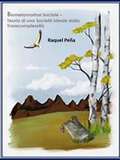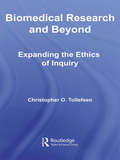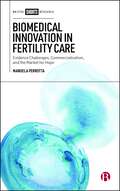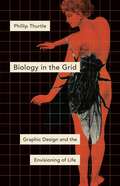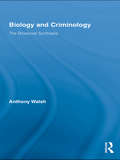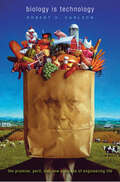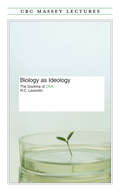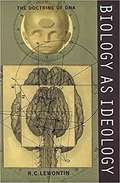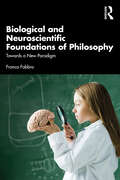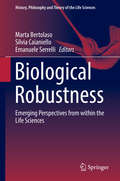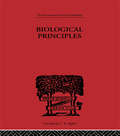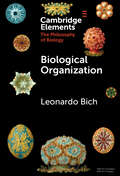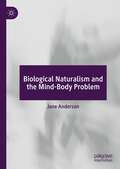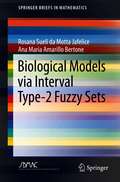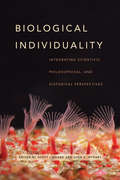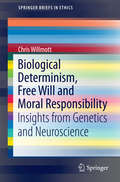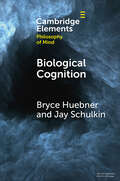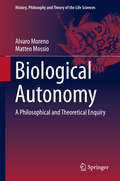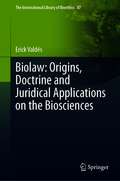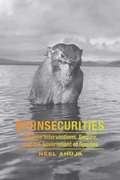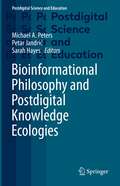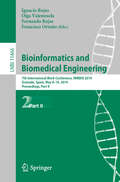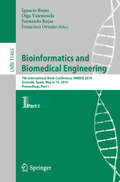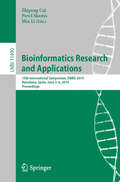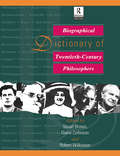- Table View
- List View
Biometamorfosi Sociale: Teoria di una società ideale dalla transcomplessità
by Raquel PeñaBiometamorfosi sociale di Raquel Peña. Teoria di una società ideale dalla transcomplessità. Siamo tutti capaci di trasformarci. Siamo tutti capaci di trasformarci. La società richiede che gli individui che la compongono prendano coscienza dell'importanza di essere persone migliori, sotto una concezione etica, morale e spirituale. Questo libro mostra i risultati di un'indagine condotta in un settore popolare venezuelano dalla percezione degli attori sociali e come la conoscenza che possiedono come fonte generatrice emerga dalle loro esperienze. È da questa ricerca che è nata la teoria: Biometamorfosi Sociale.
Biomedical Research and Beyond: Expanding the Ethics of Inquiry (Routledge Annals of Bioethics #Vol. 5)
by Christopher O. TollefsenWhat is the relationship between scientific research and ethics? Some think that science should be free from ethical and political considerations. Biomedical Research and Beyond argues that ethical guidance is essential for all forms of inquiry, including biomedical and scientific research. By addressing some of the most controversial questions of biomedical research, such as embryonic research, animal research, and genetic enhancement research, the author argues for a rich moral framework for the ethics of inquiry, based on the ideal of human flourishing. He then looks at other areas of inquiry, such as journalistic ethics, and military investigation, to see how similar they are to the ethics of scientific research. Finally, he looks at the virtues that must play a role in any life that is devoted to research and inquiry as a vocational commitment.
Biomedical Innovation in Fertility Care: Evidence Challenges, Commercialization, and the Market for Hope
by Manuela PerrottaAvailable Open Access digitally under CC-BY-NC-ND licence.This book analyses the clashes between evidence-based medicine and the dynamics of an increasingly privatised fertility care industry. With a unique focus on "add-on" treatments, it reveals how these controversial treatments are now widespread and can border on hopemongering.
Biology in the Grid: Graphic Design and the Envisioning of Life (Posthumanities)
by Phillip ThurtleHow grids paved the way for our biological understanding of organisms As one of the most visual sciences, biology has an aesthetic dimension that lends force and persuasion to scientific arguments: how things are arranged on a page, how texts are interspersed with images, and how images are composed reflect deep-seated beliefs about how life exists on Earth. Biology in the Grid traces how our current understanding of life and genetics emerged from the pervasive nineteenth- and twentieth-century graphic form of the grid, which allowed disparate pieces of information to form what media theorist Vilém Flusser called &“technical images.&”Phillip Thurtle explains how the grid came to dominate biology in the twentieth century, transforming biologists&’ beliefs about how organisms were constructed. He demonstrates how this shift in our understanding of biological grids enabled new philosophies in endeavors such as advertising, entertainment, and even political theory. The implications of the arguments in Biology in the Grid are profound, touching on matters as fundamental as desire, our understanding of our bodies, and our view of how society is composed. Moreover, Thurtle&’s beautifully written, tightly focused arguments allow readers to apply his claims to new disciplines and systems. Bristling with insight and potential, Biology in the Grid ultimately suggests that such a grid-organized understanding of natural life inevitably has social and political dimensions, with society recognized as being made of interchangeable, regulated parts rather than as an organic whole.
Biology and Criminology: The Biosocial Synthesis (Routledge Advances in Criminology)
by Anthony WalshNumerous criminologists have noted their dissatisfaction with the state of criminology. The need for a new paradigm for the 21st century is clear. However, many distrust biology as a factor in studies of criminal behavior, whether because of limited exposure or because the orientation of criminology in general has a propensity to see it as racist, classist, or at least illiberal. This innovative new book by noted criminologist Anthony Walsh dispels such fears, examining how information from the biological sciences strengthens criminology work and both complements and improves upon traditional theories of criminal behavior. With its reasoned case for biological science as a fundamental tool of the criminologist, Walsh's groundbreaking work will be required reading for all students and faculty within the field of criminology.
Biology Is Technology: The Promise, Peril, and New Business of Engineering Life
by Robert H. Carlson“Essential reading for anyone who wishes to understand the current state of biotechnology and the opportunities and dangers it may create.” —American ScientistTechnology is a process and a body of knowledge as much as a collection of artifacts. Biology is no different—and we are just beginning to comprehend the challenges inherent in the next stage of biology as a human technology. It is this critical moment, with its wide-ranging implications, that Robert Carlson considers in Biology Is Technology. He offers a uniquely informed perspective on the endeavors that contribute to current progress in this area—the science of biological systems and the technology used to manipulate them.In a number of case studies, Carlson demonstrates that the development of new mathematical, computational, and laboratory tools will facilitate the engineering of biological artifacts—up to and including organisms and ecosystems. Exploring how this will happen, with reference to past technological advances, he explains how objects are constructed virtually, tested using sophisticated mathematical models, and finally constructed in the real world.Such rapid increases in the power, availability, and application of biotechnology raise obvious questions about who gets to use it, and to what end. Carlson’s thoughtful analysis offers rare insight into our choices about how to develop biological technologies and how these choices will determine the pace and effectiveness of innovation as a public good.
Biology As Ideology: The Doctrine of DNA (The CBC Massey Lectures)
by Richard LewontinR. C. Lewontin is a prominent scientist -- a geneticist who teaches at Harvard -- yet he believes that we have placed science on a pedestal, treating it as an objective body of knowledge that transcends all other ways of knowing and all other endeavours.Lewontin writes in this collection of essays, which began their life as CBC Radio's Massey Lectures Series for 1990: "Scientists do not begin life as scientists, after all, but as social beings immersed in a family, a state, a productive structure, and they view nature through a lens that has been molded by their social experience… . Science, like the Church before it, is a supremely social institution, reflecting and reinforcing the dominant values and vices of society at each historical epoch."In Biology as Ideology Lewontin examines the false paths down which modern scientific ideology has led us. By admitting science's limitations, he helps us rediscover the richness of nature -- and appreciate the real value of science.
Biology As Ideology: The Doctrine Of DNA
by Richard C. LewontinFollowing in the fashion of Stephen Jay Gould and Peter Medawar, one of the world's leading scientists examines how "pure science" is in fact shaped and guided by social and political needs and assumptions.
Biological and Neuroscientific Foundations of Philosophy: Towards a New Paradigm
by Franco FabbroBiological and Neuroscientific Foundations of Philosophy is an authoritative text addressing both academicians and students, and it proposes an integrated and holistic view of scientific study and presents a new paradigm by which to study philosophy. It highlights, in a systematic and sufficiently simple manner, the fundamental role of neuroscience, neuropsychology and biology within philosophical reflection. Written by an expert in neuroscience, the book draws together different strands of study to explore how scientific and neuropsychological discoveries are integral to the study of philosophy and our understanding of mind. It argues to move away from a philosophical paradigm that is based solely within physics and mathematics and to embrace more complex frames of data and knowledge of psychology and biology to advance the discipline. The book also reflects on the symbolic dimensions and the concept of "information" that characterize DNA (biology), and the psyche and language (cognitive and social neuroscience). It offers an ambitious thesis that ties together the philosophical foundations of science, the evolutionary history of human beings, social organization, communication and consciousness. This interdisciplinary work will be highly beneficial for researchers and postgraduate students of neuroscience, philosophy and biological sciences, as well as those interested in the intersection between philosophy and neuroscience.
Biological Robustness: Emerging Perspectives from within the Life Sciences (History, Philosophy and Theory of the Life Sciences #23)
by Marta Bertolaso Emanuele Serrelli Silvia CaianielloThis volume reviews examples and notions of robustness at several levels of biological organization. It tackles many philosophical and conceptual issues and casts an outlook on the future challenges of robustness studies in the context of a practice-oriented philosophy of science. The focus of discussion is on concrete case studies. These highlight the necessity of a level-dependent description of robust biological behaviors.Experts from the neurosciences, biochemistry, ecology, biology, and the history and the philosophy of life sciences provide a multiplex perspective on the topic. Contributions span from protein folding, to cell-level robustness, to organismal and developmental robustness, to sensorimotor systems, up to the robustness of ecological systems.Several chapters detail neurobiological case-studies. The brain, the poster child of plasticity in biology, offers multiple examples of robustness. Neurobiology explores the importance of temporal organization and multiscalarity in making this robustness-with-plasticity possible. The discussion also includes structures well beyond the brain, such as muscles and the complex feedback loops involved in the peculiar robustness of music perception. Overall, the volume grounds general reflections upon concrete case studies, opening to all the life sciences but also to non-biological and bio-inspired fields such as post-modern engineering. It will appeal to researchers, students, as well as non-expert readers.
Biological Principles: A Critical Study (International Library of Philosophy #Vol. 6)
by J.H. WoodgerFirst published in 2000. Routledge is an imprint of Taylor & Francis, an informa company.
Biological Organization (Elements in the Philosophy of Biology)
by Leonardo BichLiving systems are complex systems made of components that tend to degrade, but nonetheless they maintain themselves far from equilibrium. This requires living systems to extract energy and materials from the environment and use them to build and repair their parts by regulating their activities based on their internal and external conditions in ways that allow them to keep living. The philosophical and theoretical approach discussed in this Element aims to explain these features of biological systems by appealing to their organization. It addresses classical and more recent issues in philosophy of biology, fromorigins and definitions of life to biological teleology and functions, from an original perspective mainly focused on the living system, its physiology and behavior, rather than evolution. It discusses and revises the conceptual foundations of this approach and presents an updated version of it. This title is also available as Open Access on Cambridge Core.
Biological Naturalism and the Mind-Body Problem
by Jane AndersonThis book offers a new theoretical framework within which to understand “the mind-body problem”. The crux of this problem is phenomenal experience, which Thomas Nagel famously described as “what it is like” to be a certain living creature. David Chalmers refers to the problem of “what-it-is-like” as “the hard problem” of consciousness and claims that this problem is so “hard” that investigators have either just ignored the issue completely, investigated a similar (but distinct) problem, or claimed that there is literally nothing to investigate – that phenomenal experience is illusory. This book contends that phenomenal experience is both very real and very important. Two specific “biological naturalist” views are considered in depth. One of these two views, in particular, seems to be free from problems; adopting something along the lines of this view might finally allow us to make sense of the mind-body problem.An essential read for anyone who believes that no satisfactory solution to “the mind-body problem” has yet been discovered.
Biological Models via Interval Type-2 Fuzzy Sets (SpringerBriefs in Mathematics)
by Rosana Sueli Jafelice Ana Maria Amarillo BertoneThis book offers a gentle introduction to type-2 fuzzy sets and, in particular, interval type-2 fuzzy sets and their application in biological modeling. Interval type-2 fuzzy modeling is a comparatively recent direction of research in fuzzy modeling. As the modeling of biological problems is inherently uncertain, the use of fuzzy sets in this field is a natural choice.The coverage begins with a succinct review of type-1 fuzzy basic theory, before providing a comprehensive and didactic explanation of type-2 fuzzy set components. In turn, Fuzzy Rule-Based Systems, or FRBS, are shown for both types, interval type-2 and type-1 fuzzy sets.Applications include the pharmacological models, prediction of prostate cancer stages, a model for HIV population transfer (asymptomatic to symptomatic), an epidemiological disease caused by HIV, some models in population growth, included the Malthus Model, and an epidemic model refers to COVID-19. The book is ideally suited to graduate students in mathematics and related fields, professionals, researchers, or the public interested in interval type-2 fuzzy modeling. Largely self-contained, it can also be used as a supplementary text in specialized graduate courses.
Biological Individuality: Integrating Scientific, Philosophical, and Historical Perspectives
by Lynn K. Nyhart Scott Lidgard and Lynn K. NyhartIndividuals are things that everybody knows—or thinks they do. Yet even scholars who practice or analyze the biological sciences often cannot agree on what an individual is and why. One reason for this disagreement is that the many important biological individuality concepts serve very different purposes—defining, classifying, or explaining living structure, function, interaction, persistence, or evolution. Indeed, as the contributors to Biological Individuality reveal, nature is too messy for simple definitions of this concept, organisms too quirky in the diverse ways they reproduce, function, and interact, and human ideas about individuality too fraught with philosophical and historical meaning. Bringing together biologists, historians, and philosophers, this book provides a multifaceted exploration of biological individuality that identifies leading and less familiar perceptions of individuality both past and present, what they are good for, and in what contexts. Biological practice and theory recognize individuals at myriad levels of organization, from genes to organisms to symbiotic systems. We depend on these notions of individuality to address theoretical questions about multilevel natural selection and Darwinian fitness; to illuminate empirical questions about development, function, and ecology; to ground philosophical questions about the nature of organisms and causation; and to probe historical and cultural circumstances that resonate with parallel questions about the nature of society. Charting an interdisciplinary research agenda that broadens the frameworks in which biological individuality is discussed, this book makes clear that in the realm of the individual, there is not and should not be a direct path from biological paradigms based on model organisms through to philosophical generalization and historical reification.
Biological Determinism, Free Will and Moral Responsibility: Insights from Genetics and Neuroscience (SpringerBriefs in Ethics)
by Chris WillmottThis book examines the way in which new discoveries about genetic and neuroscience are influencing our understanding of human behaviour. As scientists unravel more about the ways in which genes and the environment work together to shape the development of our brains, their studies have importance beyond the narrow confines of the laboratory. This emerging knowledge has implications for our notions of morality and criminal responsibility. The extent to which "biological determinism" can be used as an explanation for our behaviour is of interest to philosophers reflecting on the free will versus determinism debate. It also has repercussions for the criminal justice system; in courtrooms around the world, defence lawyers are beginning to appeal to genetic and brain imaging data as grounds for finding their clients not guilty. Can a defendant's genes or the structure of his brain be used as an excuse for his behaviour? Is criminality "hardwired"? Is it legitimate to claim "I couldn't help it, my genes made me do it"? This book appeals to anyone interested in the link between behaviour and genetics, the science and philosophy of moral responsibility and/or criminal law.
Biological Cognition (Elements in Philosophy of Mind)
by Jay Schulkin Bryce HuebnerThis Element introduces a biological approach to cognition, which highlights the significance of allostatic regulation and the navigation of challenges and opportunities. It argues that cognition is best understood as a juggling act, which reflects numerous ongoing attempts to minimize disruptions while prioritizing the sources of information that are necessary to satisfy social and biological needs; and it provides a characterization of the architectural constraints, neurotransmitters, and affective states that shape visual perception, as well as the regulatory capacities that sustain flexible patterns of thought and behavior.
Biological Autonomy: A Philosophical and Theoretical Enquiry (History, Philosophy and Theory of the Life Sciences #12)
by Alvaro Moreno Matteo MossioSince Darwin, Biology has been framed on the idea of evolution by natural selection, which has profoundly influenced the scientific and philosophical comprehension of biological phenomena and of our place in Nature. This book argues that contemporary biology should progress towards and revolve around an even more fundamental idea, that of autonomy. Biological autonomy describes living organisms as organised systems, which are able to self-produce and self-maintain as integrated entities, to establish their own goals and norms, and to promote the conditions of their existence through their interactions with the environment. Topics covered in this book include organisation and biological emergence, organisms, agency, levels of autonomy, cognition, and a look at the historical dimension of autonomy. The current development of scientific investigations on autonomous organisation calls for a theoretical and philosophical analysis. This can contribute to the elaboration of an original understanding of life - including human life - on Earth, opening new perspectives and enabling fecund interactions with other existing theories and approaches. This book takes up the challenge.
Biolaw: Origins, Doctrine and Juridical Applications on the Biosciences (The International Library of Bioethics #87)
by Erick ValdésThis book configures a consistent epistemology of biolaw that distinguishes itself from bioethics and from a mere set of international instruments on the regulation of biomedical practices. Such orthodox intellection has prevented biolaw from being understood as a new branch of law with legally binding force, which has certainly dwindled its epistemological density. Hence, this is a revolutionary book as it seeks to deconstruct the history of biolaw and its oblique epistemologies, which means not accepting perennial axioms, and not seeing paradigms where only anachronism and anomaly still exist. It is a book aimed at validity, but also at solidity because the truth of biolaw has never been told before. In that sense, it is also a revealing text. The book shapes biolaw as an independent and compelling branch of law, with a legally binding scope, which boosts the effectiveness of new deliberative models for legal sciences, as well as it utterly reinforces hermeneutical and epistemological approaches, in tune with the complexity of disturbing legal scenarios created by biomedical sciences’ latest applications. This work adeptly addresses the origins of the European biolaw and its connections with American bioethics. It also analyses different biolaw’s epistemologies historically developed both in Europe and in the United States, to finally offer a new conception of biolaw as a new branch of law, by exploring its theoretical and practical atmospheres to avoid muddle and uncertainty when applied in biomedical settings. This book is suitable for academics and students of biolaw, law, bioethics, and biomedical research, as well as for professionals in higher education institutions, courts, the biomedical industry, and pharmacological companies.
Bioinsecurities: Disease Interventions, Empire, and the Government of Species
by Neel AhujaIn Bioinsecurities Neel Ahuja argues that U.S. imperial expansion has been shaped by the attempts of health and military officials to control the interactions of humans, animals, viruses, and bacteria at the borders of U.S. influence, a phenomenon called the government of species. The book explores efforts to control the spread of Hansen's disease, venereal disease, polio, smallpox, and HIV through interventions linking the continental United States to Hawai'i, Panamá, Puerto Rico, Cuba, Congo, Iraq, and India in the twentieth and twenty-first centuries. Ahuja argues that racial fears of contagion helped to produce public optimism concerning state uses of pharmaceuticals, medical experimentation, military intervention, and incarceration to regulate the immune capacities of the body. In the process, the security state made the biological structures of human and animal populations into sites of struggle in the politics of empire, unleashing new patient activisms and forms of resistance to medical and military authority across the increasingly global sphere of U.S. influence.
Bioinformational Philosophy and Postdigital Knowledge Ecologies (Postdigital Science and Education)
by Sarah Hayes Michael A. Peters Petar JandrićThe book presents a cross-disciplinary overview of critical issues at the intersections of biology, information, and society. Based on theories of bioinformationalism, viral modernity, the postdigital condition, and others, this book explores two inter-related questions: Which new knowledge ecologies are emerging? Which philosophies and research approaches do they require? The book argues that the 20th century focus on machinery needs to be replaced, at least partially, by a focus on a better understanding of living systems and their interactions with technology at all scales – from viruses, through to human beings, to the Earth’s ecosystem. This change of direction cannot be made by a simple relocation of focus and/or funding from one discipline to another. In our age of the Anthropocene, (human and planetary) biology cannot be thought of without (digital) technology and society. Today’s curious bioinformational mix of blurred and messy relationships between physics and biology, old and new media, humanism and posthumanism, knowledge capitalism and bio-informational capitalism defines the postdigital condition and creates new knowledge ecologies. The book presents scholarly research defining new knowledge ecologies built upon emerging forms of scientific communication, big data deluge, and opacity of algorithmic operations. Many of these developments can be approached using the concept of viral modernity, which applies to viral technologies, codes and ecosystems in information, publishing, education, and emerging knowledge (journal) systems. It is within these overlapping theories and contexts, that this book explores new bioinformational philosophies and postdigital knowledge ecologies.
Bioinformatics and Biomedical Engineering: 7th International Work-Conference, IWBBIO 2019, Granada, Spain, May 8-10, 2019, Proceedings, Part II (Lecture Notes in Computer Science #11466)
by Ignacio Rojas Francisco Ortuño Olga Valenzuela Fernando RojasThe two-volume set LNBI 11465 and LNBI 11466 constitutes the proceedings of the 7th International Work-Conference on Bioinformatics and Biomedical Engineering, IWBBIO 2019, held in Granada, Spain, in May 2019. The total of 97 papers presented in the proceedings, was carefully reviewed and selected from 301 submissions. The papers are organized in topical sections as follows: Part I: High-throughput genomics: bioinformatics tools and medical applications; omics data acquisition, processing, and analysis; bioinformatics approaches for analyzing cancer sequencing data; next generation sequencing and sequence analysis; structural bioinformatics and function; telemedicine for smart homes and remote monitoring; clustering and analysis of biological sequences with optimization algorithms; and computational approaches for drug repurposing and personalized medicine. Part II: Bioinformatics for healthcare and diseases; computational genomics/proteomics; computational systems for modelling biological processes; biomedical engineering; biomedical image analysis; and biomedicine and e-health.
Bioinformatics and Biomedical Engineering: 7th International Work-Conference, IWBBIO 2019, Granada, Spain, May 8-10, 2019, Proceedings, Part I (Lecture Notes in Computer Science #11465)
by Ignacio Rojas Francisco Ortuño Olga Valenzuela Fernando RojasThe two-volume set LNBI 11465 and LNBI 11466 constitutes the proceedings of the 7th International Work-Conference on Bioinformatics and Biomedical Engineering, IWBBIO 2019, held in Granada, Spain, in May 2019. The total of 97 papers presented in the proceedings, was carefully reviewed and selected from 301 submissions. The papers are organized in topical sections as follows: Part I: High-throughput genomics: bioinformatics tools and medical applications; omics data acquisition, processing, and analysis; bioinformatics approaches for analyzing cancer sequencing data; next generation sequencing and sequence analysis; structural bioinformatics and function; telemedicine for smart homes and remote monitoring; clustering and analysis of biological sequences with optimization algorithms; and computational approaches for drug repurposing and personalized medicine. Part II: Bioinformatics for healthcare and diseases; computational genomics/proteomics; computational systems for modelling biological processes; biomedical engineering; biomedical image analysis; and biomedicine and e-health.
Bioinformatics Research and Applications: 15th International Symposium, ISBRA 2019, Barcelona, Spain, June 3–6, 2019, Proceedings (Lecture Notes in Computer Science #11490)
by Min Li Pavel Skums Zhipeng CaiThis book constitutes the proceedings of the 15th International Symposium on Bioinformatics Research and Applications, ISBRA 2019, held in Barcelona, Spain, in June 2019. The 22 full papers presented in this book were carefully reviewed and selected from 95 submissions. They were organized in topical sections named: genome analysis; systems biology; computational proteomics; machine and deep learning; and data analysis and methodology.
Biographical Dictionary of Twentieth-Century Philosophers (Routledge World Reference Ser.)
by Stuart Brown Robert Wilkinson DianThis Biographical Dictionary provides detailed accounts of the lives, works, influence and reception of thinkers from all the major philosophical schools and traditions of the twentieth-century. This unique volume covers the lives and careers of thinkers from all areas of philosophy - from analytic philosophy to Zen and from formal logic to aesthetics. All the major figures of philosophy, such as Nietzsche, Wittgenstein and Russell are examined and analysed. The scope of the work is not merely restricted to the major figures in western philosophy but also covers in depth a significant number of thinkers from the near and far east and from the non-European Hispanic-language communities.The Biographical Dictionary also includes a number of general entries dealing with important schools of philosophy, such as the Vienna Circle, or currents of thought, such as vitalism. These allow the reader to set the individual biographies in the context of the philosophical history of the period. With entries written by over 100 leading philosophy scholars, the Biographical Dictionary is the most comprehensive survey of twentieth-century thinkers to date.StructureThe book is structured alphabetically by philosopher. Each entry is identically structured for ease of access and covers:* nationality* dates and places of birth and death* philosophical style or school* areas of interest* higher education* significant influences* main appointments* main publications* secondary literature* account of intellectual development and main ideas* critical reception and impactAt the end of the book a glossary gives accounts of the schools, movements and traditions to which these philosophers belonged, and thorough indexes enable the reader to access the information in several ways:* by nationality* by major areas of contribution to philosophy e.g. aesthetics* by major influences on the thinker concerned e.g. Plato, Kant, Wittgenstein
